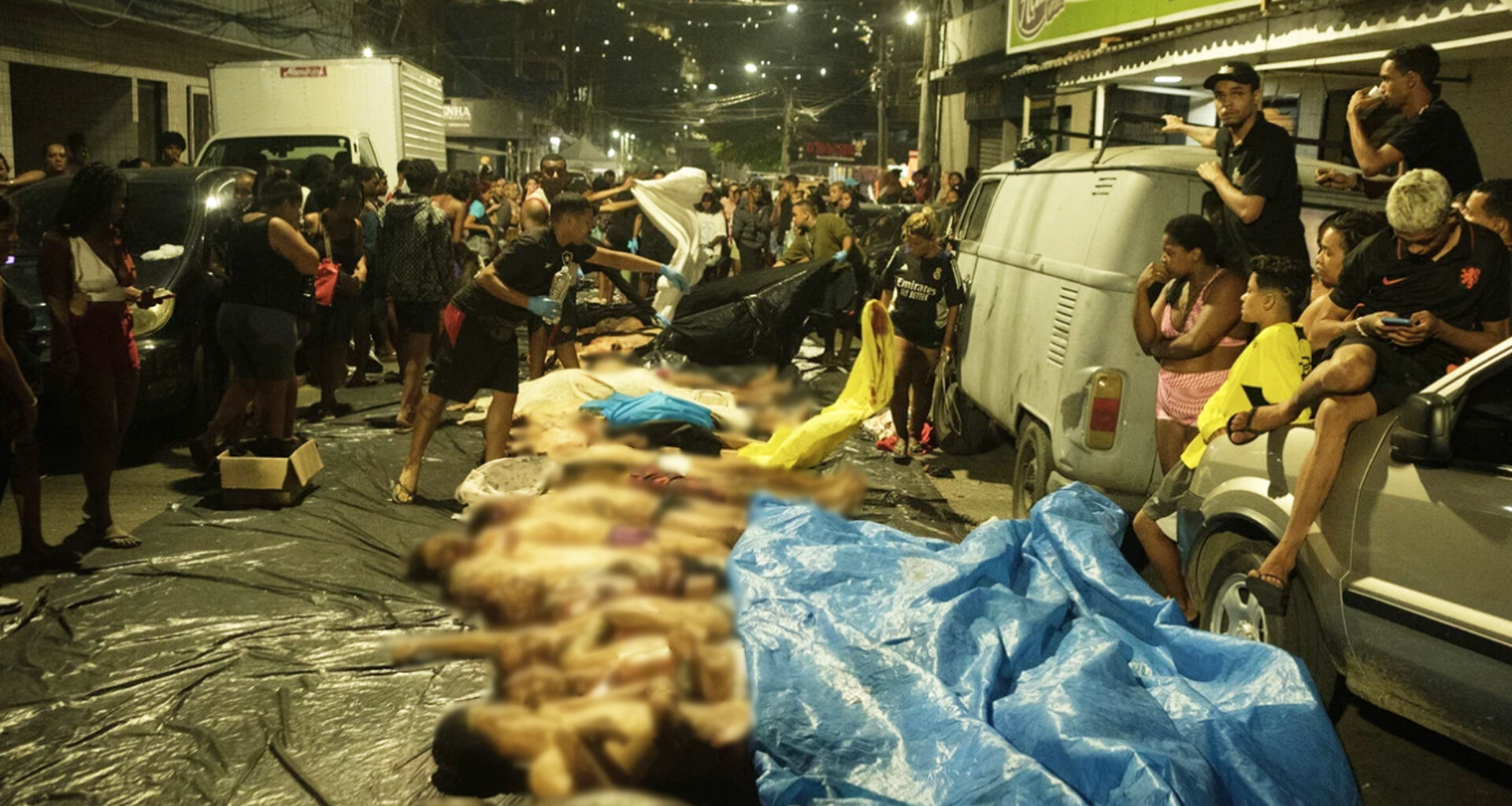Rio de Janeiro, Brazil — October 28, 2025, will be remembered as one of the saddest episodes in recent Brazilian history, especially for residents of the state of Rio de Janeiro. At least 121 people were killed in the deadliest police operation in the country’s history.
Content advisory – descriptions of lethal police violence.
The large-scale, multi-agency Operation Contenção, or Containment, was executed with over 2,500 police officers in the Alemão and Penha complexes, or “favelas,” both located in the North Zone of Rio. The operation started at 6 a.m. and lasted until 10 p.m.
The police released death toll originally stood at 58, then 63 more bodies were discovered in the forest between the two favelas. Among the killed are civilian residents, gang members and four police officers. According to the police, 113 people were arrested and 118 weapons were seized along with more than one ton of drugs.
“It was a massacre.”
Residents of Rio de Janeiro collected the bodies of their neighbors after a deadly police raid killed over 130 people, ahead of Brazil hosting the COP30 climate summit. It was the deadliest police operation in the city’s history. pic.twitter.com/IWURTRRuG7
— AJ+ (@ajplus) October 29, 2025
Several videos of the tragedy circulated throughout the day in Brazil, suggesting that the number of dead was higher than reported. A day after the release of official data, residents, family members and friends searching for their loved ones went to an area identified as Matinha — between the two favelas — and found victims with execution-style wounds, shot in the back of the head and the back, decapitated bodies and more than double the number killed than initially released.
The operation was justified as a way to capture Edgar Alves de Andrade — better known as “Doca” or “Urso” — identified as the main figure of the Comando Vermelho (CV) criminal faction.
The state governor, Cláudio Castro, a political ally of former Brazilian president Jair Messias Bolsonaro, was also involved in the operation. The Rio governor mobilized 2,500 police officers from different detachments of the Military Police and the Civil Police.
What followed was a veritable war zone involving helicopters, armored vehicles, and intense shootouts. Under pressure, the Comando Vermelho — which translates to “Red Command” in English — reacted by launching bombs via drones and firing shots at the police forces.
Amid the operation, approximately 280,000 residents in the complexes — a majority of whom are of African descent — were living among the war zone. 87 schools were directly affected, buses went out of service, and robberies and assaults in different parts of the city increased while police were carrying out their operation.
The climate of tension went beyond the limits of the immediately affected communities and reached the National Congress, where left-wing and right-wing parliamentarians exchanged accusations, transforming a day of mourning into an early electoral campaign platform.
This war-like scenario occurred shortly after the beginning of the dialogue between Brazilian President Luiz Inácio Lula da Silva and U.S. President Donald Trump regarding the tariffs imposed by the U.S. on Brazil. Furthermore, Brazil is set to host the COP30 climate summit starting on Nov. 10.
Just two months ago on Aug. 28, the Primeiro Comando da Capital (PCC), CV’s main national rival, was also targeted by the government with Operation “Hidden Carbon,” which focused on money laundering. This resulted in zero deaths and the freezing of billions of Brazilian reais. The police action directly affected the operations of the São Paulo-based criminal organization and remains the largest operation against organized crime in Brazil. This operation had the unprecedented collaboration of the Federal Revenue Service, Civil Police, Federal Police, Public Prosecutor’s Office of the State of São Paulo and Federal Public Prosecutor’s Office.
The official stated objective of Operation Containment was to execute 94 arrest warrants against leaders of Comando Vermelho in Rio and other states. Instead, what we saw was the State carrying out an unprecedented massacre, the largest televised police operation in Rio de Janeiro in the last 15 years and the deadliest in history.
Police in Brazil routinely have some of the highest numbers of police killings in the world. The deadliest raid in Rio history before this was on May 2021 when police killed 28 people during a failed raid on the Alemão complex. Two months before that, Unicorn Riot had heard from Rio resident Thainã de Meideiros, who spoke about police violating court orders meant to prevent their deadly raids.
Meanwhile, Doca remains at large.
Several protests against the massacre have taken place.
Experts with the United Nations appealed to the Brazilian government on Oct. 31 to reign in the police violence and complete an investigation on the deadly operation.
Protests erupt in Brazil after the deadliest police raid in Rio de Janeiro history.
Death and bloodshed must not be treated as public policy. Public security should guarantee
rights, NOT violate them. pic.twitter.com/PZBE2v6EFg
— Amnesty International (@amnesty) October 31, 2025
Related:
Brazil: Nearly 7,500 Fall Victim to Femicides and Police Killings
Police in Brazil Killed Record Amount of People in 2020
More Unicorn Riot coverage from Brazil.
Cover image via Leonardo Coelho/Agência Pública.
Follow us on X (aka Twitter), Facebook, YouTube, Vimeo, Instagram, Mastodon, Threads, BlueSky and Patreon.
Please consider a tax-deductible donation to help sustain our horizontally-organized, non-profit media organization:


